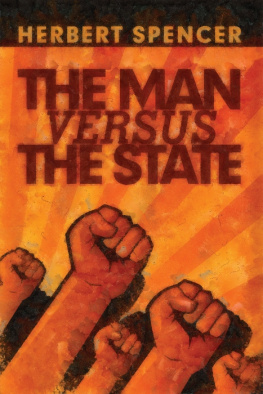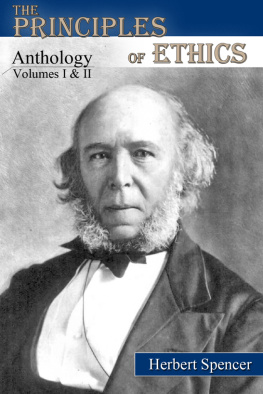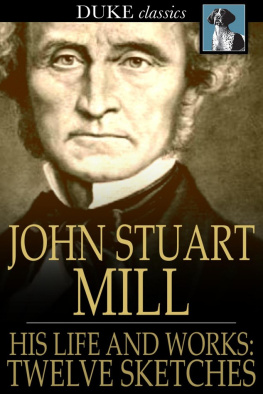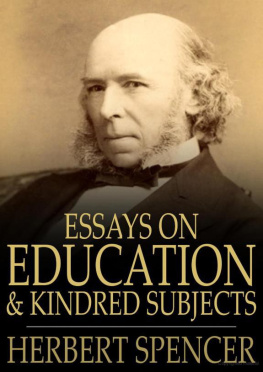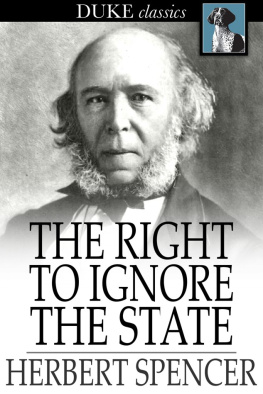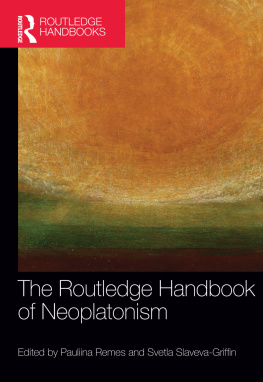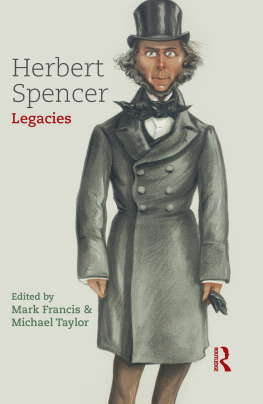THE MAN
VERSUS THE STATE
BY
HERBERT SPENCER
With an Introduction by
ALBERT JAY NOCK


1960
THE CAXTON PRINTERS, LTD.
CALDWELL, IDAHO
First printing of this American Edition, July, 1940
Second printing March, 1944
Third printing March, 1945
Fourth printing June, 1946
Fifth printing March, 1954
Sixth printing July, 1960
COPYRIGHT 1892 BY
D. APPLETON AND COMPANY
COPYRIGHT 1940 BY
THE CAXTON PRINTERS, LTD.
CALDWELL, IDAHO
Printed and bound in the United States of America by
The CAXTON PRINTERS, Ltd.
Caldwell, Idaho
90744
INTRODUCTION.
IN 1851 Herbert Spencer published a treatise called Social Statics; or, The Conditions Essential to Human Happiness Specified. Among other specifications, this work established and made clear the fundamental principle that society should be organised on the basis of voluntary coperation, not on the basis of compulsory coperation, or under the threat of it. In a word, it established the principle of individualism as against Statismagainst the principle underlying all the collectivist doctrines which are everywhere dominant at the present time. It contemplated the reduction of State power over the individual to an absolute minimum, and the raising of social power to its maximum; as against the principle of Statism, which contemplates the precise opposite. Spencer maintained that the States interventions upon the individual should be confined to punishing those crimes against person or property which are recognised as such by what the Scots philosophers called the common sense of mankind ; enforcing the obligations of contract; and making justice costless and easily accessible. Beyond this the State should not go; it should put no further coercive restraint upon the individual. All that the State can do for the best interests of societyall it can do to promote a permanent and stable well-being of society is by way of these purely negative interventions. Let it go beyond them and attempt the promotion of societys well-being by positive coercive interventions upon the citizen, and whatever apparent and temporary social good may be effected will be greatly at the cost of real and permanent social good.
Spencers work of 1851 is long out of print and out of currency; a copy of it is extremely hard to find. It should be republished, for it is to the philosophy of individualism what the work of the German idealist philosophers is to the doctrine of Statism, what Das Kapital is to Statist economic theory, or what the Pauline Epistles are to the theology of Protestantism. It had no effect, or very little, on checking the riotous progress of Statism in England; still less in staying the calamitous consequences of that progress. From 1851 down to his death at the end of the century, Spencer wrote occasional essays, partly as running comment on the acceleration of Statisms progress; partly as exposition, by force of illustration and example; and partly as remarkably accurate prophecy of what has since come to pass in consequence of the wholesale substitution of the principle of compulsory coperationthe Statist principlefor the individualist principle of voluntary coperation. He reissued four of these essays in 1884, under the title, The Man versus the State; and these four essays, together with two others, called Over-legislation and From Freedom to Bondage, are now reprinted here under the same general title.
II.
The first essay, The New Toryism, is of primary importance just now, because it shows the contrast between the aims and methods of early Liberalism and those of modern Liberalism. In these days we hear a great deal about Liberalism, Liberal principles and policies, in the conduct of our public life. All sorts and conditions of men put themselves forward on the public stage as Liberals; they call those who oppose them Tories, and get credit with the public thereby. In the public mind, Liberalism is a term of honour, while Toryismespecially economic Toryismis a term of reproach. Needless to say, these terms are never examined; the self-styled Liberal is taken popularly at the face value of his pretensions, and policies which are put forth as Liberal are accepted in the same unreflecting way. This being so, it is useful to see what the historic sense of the term is, and to see how far the aims and methods of latter-day Liberalism can be brought into correspondence with it: and how far, therefore, the latter-day Liberal is entitled to bear that name.
Spencer shows that the early Liberal was consistently for cutting down the States coercive power over the citizen, wherever this was possible. He was for reducing to a minimum the number of points at which the State might make coercive interventions upon the individual. He was for steadily enlarging the margin of existence within which the citizen might pursue and regulate his own activities as he saw fit, free of. State control or State supervision. Liberal policies and measures, as originally conceived, were such as reflected these aims. The Tory, on the other hand, was opposed to these aims, and his policies reflected this opposition. In general terms, the Liberal was consistently inclined towards the individualist philosophy of society, while the Tory was consistently inclined towards the Statist philosophy.
Spencer shows moreover that as a matter of practical policy, the early Liberal proceeded towards the realization of his aims by the method of repeal. He was not for making new laws, but for repealing old ones. It is most important to remember this. Wherever the Liberal saw a law which enhanced the States coercive power over the citizen, he was for repealing it and leaving its place blank. There were many such laws on the British statute-books, and when Liberalism came into power it repealed an immense grist of them.
Spencer must be left to describe in his own words, as he does in the course of this essay, how in the latter half of the last century British Liberalism went over bodily to the philosophy of Statism, and abjuring the political method of repealing existent coercive measures, proceeded to outdo the Tories in constructing new coercive measures of ever-increasing particularity. This piece of British political history has great value for American readers, because it enables them to see how closely American Liberalism has followed the same course. It enables them to interpret correctly the significance of Liberalisms influence upon the direction of our public life in the last half-century, and to perceive just what it is to which that influence has led, just what the consequences are which that influence has tended to bring about, and just what are the further consequences which may be expected to ensue.
For example, Statism postulates the doctrine that the citizen has no rights which the State is bound to respect; the only rights he has are those which the State grants him, and which the State may attenuate or revoke at its own pleasure. This doctrine is fundamental; without its support, all the various nominal modes or forms of Statism which we see at large in Europe and Americasuch as are called Socialism, Communism, Naziism, Fascism, etc., would collapse at once. The individualism which was professed by the early Liberals, maintained the contrary; it maintained that the citizen has rights which are inviolable by the State or by any other agency. This was fundamental doctrine; without its support, obviously, every formulation of individualism becomes so much waste paper. Moreover, early Liberalism accepted it as not only fundamental, but also as axiomatic, self-evident. We may remember, for example, that our great charter, the Declaration of Independence takes as its foundation the self-evident truth of this doctrine, asserting that man, in virtue of his birth, is endowed with certain rights which are unalienable; and asserting further that it is to secure these rights that governments are instituted among men. Political literature will nowhere furnish a, more explicit disavowal of the Statist philosophy than is to be found in the primary postulate of the Declaration.

